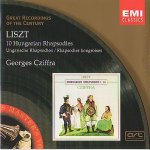Georges Cziffra (1921-94) invariably polarized critical opinion, arousing stormy controversy everywhere he played. In works by the Viennese classicists Cziffra was rightly censured, yet his performances of Franz Liszt could provoke near hysteria among audiences. But hearing these accounts of 10 Liszt Hungarian Rhapsodies, I’m reminded of the best–and indeed the worst–that this enigmatic artist could perpetrate in the recording studio.
First, as Harold C. Schonberg pointed out in a New York Times review of one of his concerts, “Cziffra could never play louder without getting faster.” That particular shortcoming easily could be attributed to haphazard and ill-disciplined technique, and the trait reached its worst in Cziffra’s infamous recordings of Chopin’s Études. And there’s a wayward, cavalier abandon about these readings of the Hungarian Rhapsodies that doesn’t stand close scrutiny alongside a metronome. But that’s precisely why these recordings are so fascinating, sometimes exasperating, and always irresistible. As Alfred Brendel writes, “the Rhapsodies come to life through the improvisatory spirit and fire of the interpreter; they are wax in his hand like few other pieces in existence.”
So in this music, perhaps, you can afford to be less fixated about textual minutiae than in much else that demands far greater precision and faithfulness to the letter of the score. That doesn’t excuse Cziffra’s famously arrogant remark that music critics were “carrion beetles of the mind…easily recognized by their boundless pride and their pathetic intellect”, but if you’re mesmerized by coruscating pianism and by the Svengali-like musical personality behind the notes, these performances should satisfy in some degree. However, don’t overlook the Philips Duo reissue of Michele Campanella’s complete traversal of Liszt’s Hungarian Rhapsodies; the playing might be more earthbound, but it’s consistently more accurate than Cziffra’s, and the piano sound of the Philips transfer is more satisfying and truthful.
































